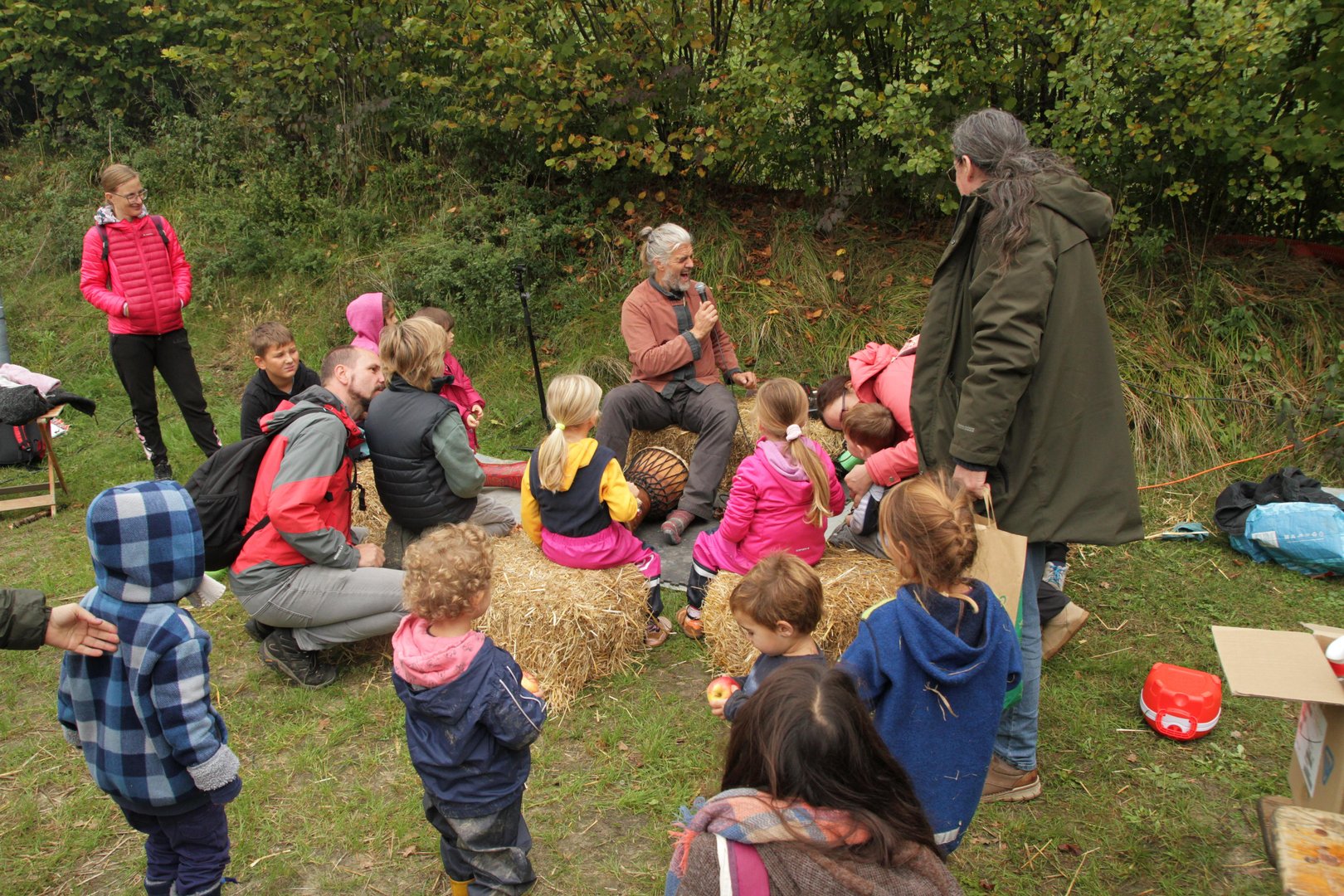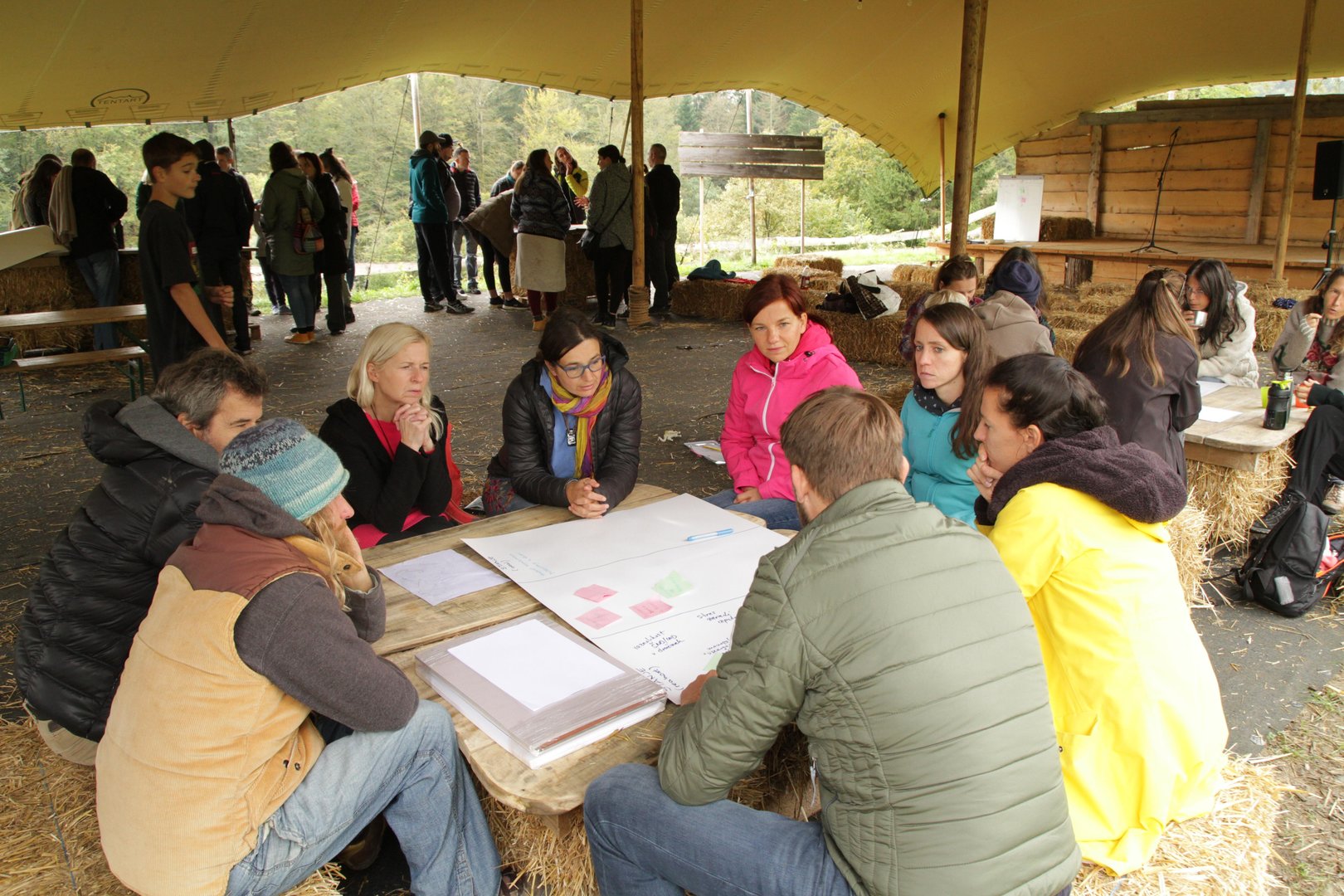"Children don't have to be taught to learn, they don't have to be introduced to learning, they are born with a natural desire to absorb all the knowledge of this world," Urša Plešnar, a 'forest tutor' at Gozdalnica, where a very special form of schooling through play and experience takes place in the shelter of the forest, recently told a gathering of families and home-schooling insiders at Mažije Hill. She sees her task and responsibility as helping to "give children their childhood back".
"Lifelong learning is also something that comes naturally to us. The problem arises when children in school become overwhelmed by the curriculum, by sitting, by having to learn a specific subject at a specific time. And they are no longer allowed to play. It is through play that we learn the most. And experientially. So the real question is how not to take away children's interest in the world around them and their natural intrinsic motivation to learn, which we all have, even adults," says the pioneer of forest education in our country.

For children's independence and natural development
According to statistics from the Ministry of Education, the number of home-schooled children has been on the rise since 2004: in 2020, 400 children had this status, dropping to 869 last school year and 696 this year thanks to a new law. It seems, however, that it is mainly informed parents who are persisting in the commitment to home-schooling, who are living the new education for their children in a holistic way.
This is why families who educate children at home recently gathered at Lake Gradiška near Lukovica, organised by Mažije hill and the Tara Foundation, to exchange experiences, to connect and support each other, to exchange words about their problems and issues, and to find common points, points of convergence and ways to organise and connect even more.
For the children, the organisers have organised a clay spindle workshop, a painting workshop and a music workshop. After all, for them, it was actually a day similar to their everyday lives - except that they also listened to adults talking here and there. But they didn't let it bother them, creativity is in their nature, so for them it was another day of play and learning new skills.
The first part of the day was spent by home educators using the field force analysis method, with Nara Petrovic leading the workshop. This kind of analysis helps us to understand what tensions exist within us and externally, from society and the state, and to identify which drivers help us to reach the desired state and which brakes hinder us from getting there. It turns out that there is a lot of fear, especially of change and institutions, and that connecting with one another really makes it possible to break through this ice and move forward.
European Movement
"The movement to educate children at home is not limited or isolated within our small country, but is part of a wider global movement," says Mateja de Laat, historian, researcher, author, development manager of the Magic Tree learning method (magictree.si), member of the Homeschooling Europe network and, last but not least, a mother who has been successfully navigating the meanders of home education for 15 years. "At European level, a non-governmental organisation for the education of children at home is being set up, with the aim of bringing together people from all over Europe to show that this is not a fad of individual parents who want to do something their own way, but a legitimate form of education that has a very long tradition in certain parts of the world, especially in the Anglo-Saxon world. It is part of the culture. We have known it here, too. Historically, home education has been the primary form of education and, according to the 1948 Declaration of Human Rights, we parents have the priority right to choose the education of our children. Education is also enshrined as a freedom in the Slovene Constitution. Unfortunately, our legislation does not reflect the Constitution and education is not free here in Slovenia."
Constitutional revision efforts
Marjana Kos from the Civic Initiative for Home Education also highlighted some aspects of access to rights in home education. Marjana is an economist, and in 2006 she completed a Master's degree in Integrated Science at Schumacher College in the UK on the topic of money.
In the past months, the Civil Initiative for Home Education has been looking for ways to provide the best legal, formal and human options for holistic education. Now the Citizens' Initiative (CI) is taking these efforts further. In the light of the tightening of conditions for home educated children announced and legislated last year, CI is preparing an initiative for a constitutional review of the new Primary School Act. They have decided to wait until the start of the 2024/25 school year to see how many children are actually being home educated, who is willing to join the initiative and will also provide the relevant documentation, and also to see the practical problems with the implementation of the new law, such as the fact that will be held from February onwards.
If anyone would like to join the initiative for a constitutional revision, there is still a chance: in this case, please contact civin.ind@gmail.com. The actors of the civic initiative hope that the Constitutional Court will rule that this law is not in line with the Slovenian Constitution and that the provisions concerning home education will be nullified.

Other initiatives are also emerging, such as the Lada Centre, an umbrella organisation for a form of primary education at home, which aims to bring under its umbrella all children and families who have chosen this form of education or who wish to pursue self-directed education. The Centre offers to communicate with the systemic institutions in order to recognise and raise the profile of this type of education in Slovenia, which is different, but which should not be discriminated against. The founder and director of the Lada Centre is Klavdija Hočevar Kastelic and the organisation's website is lada-center.education.
Tadej Rifel's decision to home-school his children was primarily so that his children would have a different environment, one that would encourage them to explore and experiment, rather than just follow and listen to the pre-prepared material that the teacher has to present according to the curriculum. He wants more independence and exploration for his children, leading them to discover their own interests and abilities. To this end, he is also co-building the Kajžica community, which helps to support home-schooled children.
Source: https://sensa.metropolitan.si/za-navdih/izobrazevanje-na-domu-povezovanje-se-zacenja/
Prevod: Mateja de Laat



